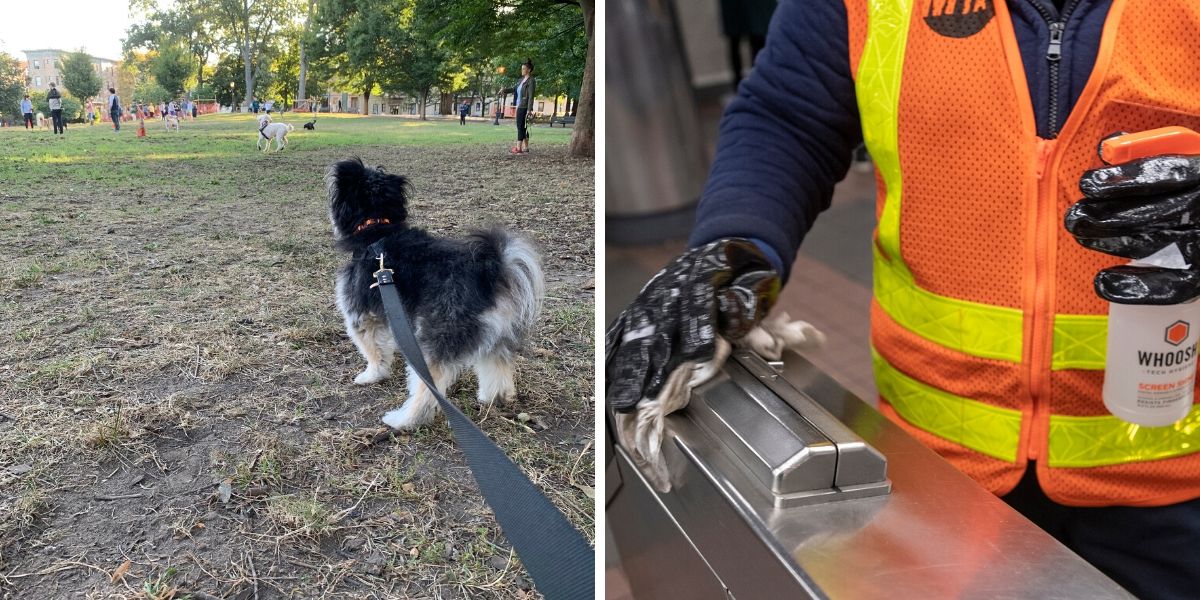COVID-19 Reaches the Gig Economy


One of the first things I did when I moved to New York was sign up for Wag, an app-based dog-walking service. I love both dogs and walking around my Brooklyn neighborhood, and I needed a source of income that would be conducive to my graduate school schedule. I made $12 per 30-minute walk, and $33 per day of dog-sitting. Thanks to some regular dog walks I could rely on, combined with a number of dog-sitting gigs, I’d been able to make ends meet, as well as save plenty of time for homework. But COVID-19 from the novel coronavirus changed all that. The unprecedented pandemic has thrown a wrench into the economic stability of people in the United States and around the world, including those working in the foodservice industry, hourly workers at clothing and bookstores, and other non-salaried workers.
As more people began to work from home in just a matter of days, I watched as the number of dogs available on the Wag app decreased, likely because owners became more available to take their dogs out themselves, and to adhere to the social-distancing policies enacted by the Center for Disease Control (CDC). In any given day before COVID-19 began dominating the news cycle, I could count on anywhere between 15 to 30 dogs being available within a ten-mile radius of my home. The city that never sleeps was true for dogs, that is until this virus. By the second week of March, there were only a couple of dogs available for walking, and often none at all. A pit began to form in my stomach as I wondered how I was going to pay my rent come April 1 with my main source of income greatly diminished. And with coffee shops, restaurants and other establishments shuttering, the solution to my impending economic woes was not as simple as “getting another job.” And with the few dogs that are still available, I feel guilty hopping on a train—a source of transportation that should be used by medical personnel and essential city employees only—to walk a dog and potentially infect someone else. While I’m at a low risk of falling dangerously ill from the virus, it doesn’t mean that people around me—such as the elderly, those with autoimmune diseases, and those with chronic illness—are as well.
I’m not alone in my economic struggles. According to the Bureau of Labor Statistics, there are approximately 55 million people across the country who are considered gig workers, and those numbers are expected to continue to surge in the next few years. With a rise in app-based companies like Wag and the food delivery service Postmates, the number of gig workers has ballooned in the last decade. As people rightfully stay inside and don’t go to work, out to eat, or to a concert, that’s another babysitter, Uber driver and sound engineer who isn’t getting paid.
The struggling gig economy is not a U.S. phenomenon. In Asia, which reported the first cases of the virus, gig workers are similarly affected. Governments in countries like Singapore are offering economic incentives to businesses in an effort to get them to take care of their employees, but these protections fail to take gig workers into account. As the number of gig workers rises in the U.S., the same is true across the world.
“As people rightfully stay inside and don’t go to work, out to eat, or to a concert, that’s another babysitter, Uber driver and sound engineer who isn’t getting paid.”
What’s more, gig workers are less likely than traditional employees to have insurance, since companies aren’t required to offer insurance to people who are considered independent contractors or short-term employees. These types of workers must seek insurance options through providers outside of the companies for which they work. Unless you can get insurance through a spouse or you’re young enough (26 or younger) to stay on a parent’s plan, many gig workers opt to go through life without insurance. This problem spirals into other areas of life, too. There’s a lack of worker’s compensation and laws guaranteeing insurance for independent contractors who are unemployed. In this unprecedented situation, many people like me who rely on an assortment of gigs are now left in the lurch.
Gig workers are certainly not the only type of worker who is surely in a tricky financial situation right now. Most people who are paid hourly and are employed in the food and entertainment industries are facing similar challenges. But while these groups of people can file for unemployment as their job futures remain uncertain, gig workers will have a harder time doing this. Since employers contribute to an unemployment fund, their full-time employees who are laid off are eligible to receive unemployment benefits from the federal government. However, because gig workers are defined as independent contractors, they are generally ineligible to receive these same benefits.
With gig worker numbers on the rise and no end in sight as to how long people will be in self-isolation due to the coronavirus, there needs to be reform within the industry. A stimulus package like the one Sen. Mitt Romney (R-UT) introduced, which would allocate $1,000 to every American, is a step in the right direction, but it’s not going to make ends meet for many people; my April rent would eat up nearly that entire sum. Rather, we need systemic change in how employers are allowed to classify people who are compensated by them. As it stands, it’s hard for low-level gig workers to engage in collective bargaining. Wag, for instance, makes it very difficult for me to engage with another Wag walker, or even a dog owner. The app prohibits me from typing out my phone number or giving out any contact information. These policies exist in part for my own protection, but they have the side effect of making it more difficult for walkers to unionize or protest for higher wages.
Access to unemployment benefits, worker’s compensation and employer-sponsored healthcare should not be kept out of a gig worker’s reach. Any person working in some capacity for a company should have the option to access company benefits. This will become increasingly important as more businesses opt to take advantage of the economic benefits of hiring independent contractors instead of full-time traditional employees. But right now, as the coronavirus reminds us of our most basic human needs, companies need to keep our own needs in mind, too.
Emmy is a graduate student at New York University’s program in international relations and journalism. She graduated from James Madison University in 2017 and spent two years working at an NBC news affiliate in Charlottesville, Va. She focuses on the intersection of music and politics, and her thesis explores Welsh music in Patagonia, Argentina. When she’s not in class, she can be found walking dogs all across Brooklyn.




